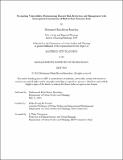Navigating Vulnerability: Harmonizing Disaster Risk Reduction and Management with Socio-spatial Construction of Risk in Post-Tsunami Aceh
Author(s)
Ramadani, Muhammad Rizki Rayani
DownloadThesis PDF (57.01Mb)
Advisor
Wendel, Delia Duong Ba
Terms of use
Metadata
Show full item recordAbstract
How can a city that once suffered the world's deadliest tsunami prepare for future disasters? This thesis is a collection of stories from those who have historically been considered “unwanted, powerless, and marginalized” due to multi-tiered and differentiated citizenship. It examines the case of Banda Aceh in Indonesia nearly two decades after a devastating earthquake and tsunami that wiped out a third of its population, and a peace agreement that ended three decades of violent conflict. The question posed is: Does the narrative of Build Back “Better” remain relevant in representing the context of long-term development?
This study primarily aims to deconstruct the logic of disaster risk reduction and management (DRRM) and territorial planning, which is rational and techno-scientific, built upon post-colonial relation networks. Through historical comparative analysis, the case of three coastal neighborhoods, also known as “gampong”, reveals the limitations of this approach. It does not necessarily reduce vulnerability. Instead, it intensifies it through a systemic process of “vulnerabilization” (Lamb and Vale, 2024 [forthcoming]), utilizing the logic of sacrifice and necropolitics (Mbembe, 2002), and further reinforcing "quasi-citizenship," where institutions with limited capabilities deny basic rights to marginalized communities. This thesis emphasizes that a disaster is not merely a natural hazard—it is an interaction with vulnerability, a state that is institutionally, historically, politically, ideologically, and spatially produced (Wisner, 2004).
As a result, this study encourages reevaluating disaster risk reduction and management, specifically incorporating post-colonial critiques into theory-building. It proposes shifting away from universal models favoring high modernism or progress and advocates for a balanced approach that genuinely focuses on “the people”. Thus, this thesis advocates for a new methodology for closer relations in addressing affect, lived experience, and historical analysis in planning as legitimate ways of knowing. Acknowledging trauma, collective memory, and spatial expressions of belonging as valid forms of capabilities for disaster risk reduction and management is a crucial step to actualize equitably resilient cities.
Date issued
2024-05Department
Massachusetts Institute of Technology. Department of Urban Studies and PlanningPublisher
Massachusetts Institute of Technology